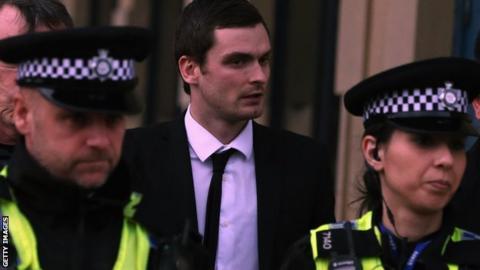
As Adam Johnson begins his six-year sentence after being convicted of sexual activity with a child, having also pleaded guilty to one count of grooming and one count of kissing the girl, there is an understandable desire to make sure football is doing everything it can to stop such a crime happening again.
If it is a worthy aspiration, the sport has been here before; in March 1999, another former England winger, Graeme Rix, at the time assistant coach at Chelsea, was sentenced to 12 months in prison for having unlawful sex with a 15-year-old girl.
That it could easily occur once more is explained for some by an easy if unsavoury equation: a lifestyle of entitlement and avarice, a moral black hole when elite players should be role models.
Except this is about more than just football, and more specific than some ethical malaise among millionaire young men and those who advise them.
You may or may not be comfortable with footballers, Johnson among them, who earn three times as much in a week as the average annual wage in the town where they play, or who choose to spend some of that on blinged-up luxury cars, or who have sexual relations with women who are not their partners.
To conflate a materialist lifestyle or promiscuity between consenting adults with what Johnson did, however, is to ignore the very clear distinction between what one individual might consider distasteful and what society as a whole has deemed illegal.
To blame football for Johnson, one would equally have to blame the public relations industry for the indecent assaults on young girls carried out by Max Clifford, or the teaching profession and television industry for the two indecent assaults on teenage boys committed by former weatherman and biology teacher Fred Talbot.
To blame football for Johnson one would also have to attribute to it the largesse of Scotland and Norwich striker Steven Naismith, who pays for Christmas lunch for hundreds of homeless people in Glasgow each year, or Arsenal and Germany midfielder Mesut Ozil for funding the medical treatment for 23 Brazilian children after his nation’s World Cup triumph in 2014.
There are thousands of professional footballers in the UK. Only one was convicted at Bradford Crown Court.
Johnson committed his crime because he chose to, not because he was a footballer. His behaviour stands outside his profession, just as Talbot’s crimes do not condemn other biology teachers or indicate a crisis of morality among celebrity meteorologists.
What all those cases did have in common were the circumstances to allow the perpetrator to act. And that is where not just football, but sport as a whole, must look to learn the lessons of what was revealed during the two-week trial.
The exploitation of children happens when power, opportunity and secrecy come together with individuals who want that exploitation to happen.
Johnson’s power came from his standing as the victim’s favourite player. His opportunity arose through a combination of his predatory actions and the ease with which social media facilitated the grooming process; after initial contact had been established on Facebook, the pair exchanged 834 WhatsApp messages in little more than a month before switching to Snapchat. The secrecy Johnson tried to ensure through coercion and denial.
Could Johnson have done what he did if he had not been a footballer? The NSPCC made clear its stance after his trial: “Johnson cynically used his celebrity status as a professional footballer to groom and sexually abuse an impressionable schoolgirl.”
That is not the same as blaming the sport itself. But it does leave those in power in the game wondering what safeguards are required, and which might actually make a practical difference.
The Professional Footballers’ Association has talked of the need for guidance and education of young players. The players’ union already runs training programmes which incorporate “the theme of personal integrity for all professional players, ensuring they are fully informed on such issues and includes sexual consent, standards of behaviour and respectful relationships in person and on social media”.
That is admirable, but it does little in such cases as Johnson’s, where evidence given in court indicates he was both aware of the age of consent and content to ignore it.
Clubs could ask players to sign codes of conduct, except no code can be more stringent that the laws of the land that someone like Johnson was already willing to disregard. Clubs might insert clauses in contracts that allow the suspension of players charged with serious offences for the duration of the trial, except to do so would leave them open to the accusation of deciding against innocence before it had been proven in court.
One of the most disturbing aspects of the Johnson case for many people was the adoration the victim clearly felt for the player before his acts. A Sunderland season-ticket holder, she had his name printed across the back of her shirt.
And here lies the most troubling thought for both football clubs and those who support them.
Successful elite sportspeople are deified in the way that was once the preserve of television stars and musicians. Just as that has created opportunities in those industries for the exploitation of the vulnerable, from the serial crimes of Jimmy Savile to the abuse committed by former Lostprophets singer Ian Watkins, so that climate of adoration in sport opens the possibility of the same manipulation and mistreatment.
It does not excuse the actions of Johnson, and it does not implicate the football authorities. But it creates an opportunity for the powerful and corrupt to exploit. Preventing that will be an immense challenge for both football and the wider sporting community.



